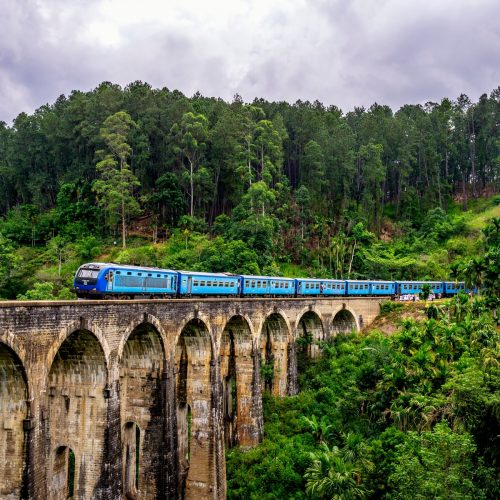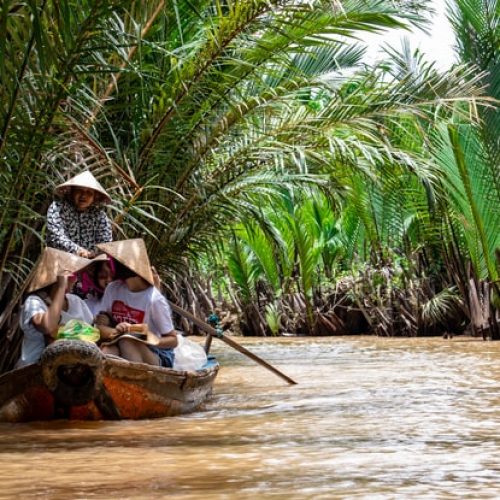Top 5 ways to fly more sustainably
At Travelling Whale, we love sustainable and conscious travel. As lockdown gradually eases and travel eventually becomes possible again here are our top 5 ways to fly more sustainably.
LIMITING USE OF SHORT FLIGHTS
Whilst long haul flights can be unavoidable; short flights, unfortunately, use a significant amount of carbon emissions in comparison. Shaking up your transportation can be a great way to be environmentally conscious. At Travelling Whale we champion SLOMO travel and sustainability is one of the added benefits when travelling in slow motion. We recommend researching alternative ways to get to your destination, mainly travelling by land.
Some great examples are taking a night train through Vietnam or cruising along the beautiful and peaceful Mekong river from Laos or Thailand. Using coaches will take you way off the beaten track and through unique mountain ranges or the countryside. It may not be as quick as flying but trust us when we say it’s a great way to make memories and take in your surroundings. Researching alternative travel can make a more exciting build-up to your trip as well as exciting stories and experiences to retell. Most of all, these alternatives can be ten times more sustainable than flying. Sometimes travel is about the journey and not only the destination.



RETHINKING CONNECTING FLIGHTS
Another of our top 5 ways to fly more sustainably is to decrease the use of carbon emissions by choosing a direct flight instead of a connecting flight. Flying direct is the most sustainable and responsible way to fly, and it’ll be a far quicker journey to your destination. The less overall hassle can make a more relaxing and smooth trip. As mentioned, shorter flights emit significantly more C02 emissions and non-C02 emissions than the long haul.
TRAVELLING LIGHTER
At Travelling Whale we love inspiring sustainable and responsible travel; for this reason, it’s made it onto our top 5 ways to fly more sustainably. Packing is perhaps one of the most daunting tasks of any trip. Thrown into a slew of what-ifs, start contemplating taking a raincoat to your destination during it’s hot and dry season or wondering if it’s worth taking your favourite tea bags just in case. Large amounts of weight during a flight can contribute to excessive use of carbon emissions. Smart packing and having your destination well-researched can do wonders to ease the process. A lighter bag lightens the overall stress of the trip, so you can sit back, relax and have room to be present as well as eco-friendly.



EXCESS WASTE
Another tip in our top 5 ways to fly more sustainably is becoming mindful of excess waste. A massive part of your flight journey is, of course, eating and drinking. Flying is in such an environment where single-use plastics are simply the norm, as tempting as it is to use them, it can create an immense amount of waste as a result. Some options for avoiding plastic containers is to bring a reusable water bottle and coffee cup with you (Net Zero Company have a fantastic selection). Of course, in most airports, you are unable to pass liquids through check-in, but there will always be a water fountain or a location to access water. Depending on the rules of the airport and airline, consider bringing your own packed lunch that uses significantly less packaging. Of course, in a post-COVID-19 world, it’s important to be conscious of hygiene, and one-use items are often the go-to. However, if it’s possible to be both safe and sustainable on your flight, it’s well worth going the extra mile.
GOING VEGETARIAN FOR YOUR FLIGHT MEAL
Picking a vegetarian or vegan flight meal is another of our top 5 ways to fly more sustainably. The greenhouse gas emissions, land space and water used to sustain the meat industry can be brutal. Cutting meat from your diet can do wonders in helping a more sustainable and eco-friendly world. Whilst flight meals don’t always have the best reputation; you often receive a more specialised and healthier veggie meal compared to the average. As you become more conscious of your dietary footprint, being flexitarian can do wonders. Going veggie for one or two meals a week can be a fantastic help to the environment and is an overall more sustainable way of eating.

Freelance travel writer
